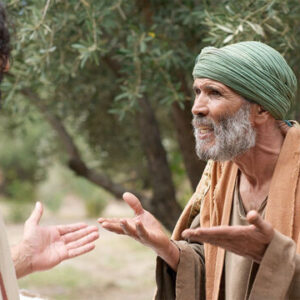 It is interesting to see the many different personalities among the apostles. One of Jesus’ greatest miracles was to take this assorted group of 12 and turn them into missionaries who took the message of salvation to the ends of the earth. (Judas, of course, would be the only exception.) Is it any wonder Jesus became so irritated with their actions? That’s why he made statements like these: “Do you still have no faith?” (Mark 4:40). “Don’t you understand this parable? How then will you understand any parable?” (Mark 4:13). “Do you still not see or understand?” (Mark 8:17). “What were you arguing about on the road?” (Mark 9:33). “Do you still not understand?” (Matthew 16:9). “Stop grumbling among yourselves!” (John 6:43). And regarding their faith, Jesus had to say repeatedly, “You of little faith, why are you so afraid?” “You of little faith, why did you doubt?” “You of little faith, why are you talking among yourselves?” “You have so little faith!” Yet the loving Master assured them also, “You did not choose me, but I chose you . . . to go and bear fruit” (John 15:16).
It is interesting to see the many different personalities among the apostles. One of Jesus’ greatest miracles was to take this assorted group of 12 and turn them into missionaries who took the message of salvation to the ends of the earth. (Judas, of course, would be the only exception.) Is it any wonder Jesus became so irritated with their actions? That’s why he made statements like these: “Do you still have no faith?” (Mark 4:40). “Don’t you understand this parable? How then will you understand any parable?” (Mark 4:13). “Do you still not see or understand?” (Mark 8:17). “What were you arguing about on the road?” (Mark 9:33). “Do you still not understand?” (Matthew 16:9). “Stop grumbling among yourselves!” (John 6:43). And regarding their faith, Jesus had to say repeatedly, “You of little faith, why are you so afraid?” “You of little faith, why did you doubt?” “You of little faith, why are you talking among yourselves?” “You have so little faith!” Yet the loving Master assured them also, “You did not choose me, but I chose you . . . to go and bear fruit” (John 15:16).
One of the apostles who seems to have caused some disappointment was Philip. Writer J. G. Greenbough, author of “The Apostles of Our Lord,” described Philip this way: “His mind was precise, methodical, and almost mechanical—the mind of a plotting, accurate, conscientious businessman—but with no originality.” Another author likened Philip to a “bean counter.” Philip was the timid intellectual disciple who had difficulty reaching a conclusion. Perhaps there are some “Philips” in your life.
Philip was the first of the disciples to be actually called by Jesus. After his calling, he shared the news with his friend Nathanael. The first we hear of Philip after his calling is at the feeding of the five thousand. Here we get an idea of Philip’s mind at work. After looking at the throng of people, Jesus asked Philip how they could possibly be fed. “He asked this only to test him” (John 6:6). Instead of telling Jesus, “Lord, we know you can find a solution to any problem,” his mental calculator began to lay out the facts: “Eight months’ wages would not buy enough bread for each one to have a bite!” (6:7). He became so caught up in the arithmetic that he was totally helpless.
The next time we meet Philip is during Holy Week. “Now there were some Greeks among those who went up to worship at the Feast. They came to Philip, who was from Bethsaida in Galilee, with a request. ‘Sir,’ they said, ‘we would like to see Jesus’” (John 12:20,21). These men were searching for Christ and asked Philip an easy question. Again Philip was tongue-tied for a direct answer. In his fumbling for what to say, “Philip went to tell Andrew; Andrew and Philip in turn told Jesus” (12:22).
The last time Philip speaks is in the upper room. Jesus said he was going to be with the Father. “‘If you really knew me, you would know my father as well. From now on, you do know him and have seen him.’ Philip said, ‘Lord, show us the Father and that will be enough for us’” (John 14:7-8).
After three years of seeing the Father through the Lord Jesus, Philip still was oblivious to whom Jesus really was. Jesus chided him, “Don’t you know me, Philip, even after I have been among you such a long time? . . . Don’t you believe that I am in the Father, and that the Father is in me?” (14:9,10). For years Philip had gazed into the face of Jesus, never realizing that he was looking into the eyes of God.
The Bible says nothing about Philip’s time as a missionary. Some think he was the second apostle to die. Philip teaches us that there is a time for calculating and plotting, yet that should never cause us to take our focus off the One who is in control of all things. And yes, Philip did finally see all the puzzle pieces in place at the Day of Pentecost. Doesn’t that make us appreciate the Lord’s patience in training us?
Lord, help me to clearly understand your plan of salvation and then to share it with others. Amen.
